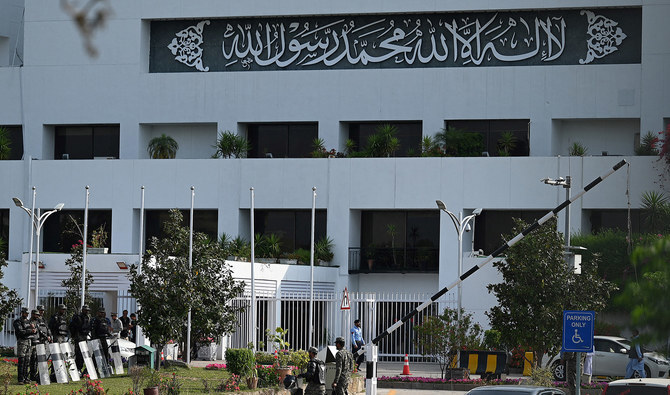ISLAMABAD: Pakistan’s ruling coalition will table the controversial constitutional amendments package in parliament for approval in the first week of October, the government’s legal adviser Barrister Aqeel Malik has confirmed, adding that the document will be presented after a “broader consensus” is reached between political stakeholders and the country’s legal fraternity.
Pakistan’s government was unable to present a set of history-making constitutional amendments last Monday after failing to secure the required two-thirds majority needed for them to pass. The proposed amendments are expected to establish a federal constitutional court, raise the retirement age of superior judges by three years and modify the process for the appointment of chief justice of the Supreme Court of Pakistan.
The matter has raised widespread concerns among opposition parties and independent experts who say the moves are aimed at increasing the government’s power in making key judicial appointments and dealing with the defection of lawmakers during house votes. The opposition Pakistan Tehreek-e-Insaf (PTI) party has alleged that the amendments are an attempt to grant an extension to incumbent Chief Justice of Pakistan Qazi Faez Isa, who is widely viewed to be aligned with the ruling coalition and in opposition to its chief rival, the PTI. Pakistan’s defense minister has rejected the allegations, saying that the amendments address “constitutional imbalances,” adding that public representatives have the right to undo any “intrusions” into parliamentary powers and the constitution.
Malik, adviser to the Ministry of Law and Justice, told Dawn News on Sunday night that the government will present the amendments during the “beginning of October” after it receives feedback from the Jamiat Ulama-e-Islam Pakistan-Fazl (JUI-F) party and Pakistan’s legal fraternity.
“I think it is expected that we will lay [constitutional amendments in parliament] in the beginning of October,” Malik said. “After reaching a broader consensus with opposition and other stakeholders. In the first week of October.”
Aqeel said that out of the 55 amendments proposed, the government has withdrawn amendments to Article 8 (laws inconsistent with or in derogation of fundamental rights to be void) and Article 243 (command of Armed Forces).
He said amendments to Article 243 had been “put on the back burner,” saying that it revolved around the tenures for service chiefs in the country.
RESERVED SEATS
The government has proposed these amendments after a string of Supreme Court judgments that have ostensibly challenged Prime Minister Shehbaz Sharif’s coalition government, mostly notably a July 12 verdict by a 13-member bench of the Supreme Court that declared the PTI eligible for reserved parliamentary seats.
The verdict dealt a major blow to Sharif’s weak ruling coalition, which may lose its two-thirds majority in Pakistan’s parliament if the verdict is implemented. Sharif’s PML-N party has filed a review petition in the Supreme Court against the verdict.
PTI candidates contested the Feb. 8 general elections as independents after the party was barred from polls on the technical grounds that it did not hold genuine intra-party polls, which is a legal requirement.
Subsequently, the PTI-backed candidates won the most seats in the election, but the Election Commission of Pakistan (ECP) ruled independents were ineligible for their share of 70 reserved seats — 60 for women, 10 for non-Muslims. The reserved seats were then distributed among other parties, mostly those in the ruling coalition, a decision Khan allies contested in the court.
Reserved parliamentary seats for women and minorities are allocated in Pakistan in proportion to the number of seats a political party wins in general elections. This completes the National Assembly’s total 336 seats.
A simple majority in Pakistan’s parliament is 169 seats.












